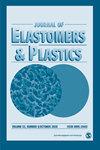乘用车子午线轮胎胎面用植物油乳化丁苯橡胶
IF 1.6
4区 材料科学
Q4 MATERIALS SCIENCE, MULTIDISCIPLINARY
引用次数: 1
摘要
目前乳液聚合丁苯橡胶(E-SBR)已扩展到各种石油基矿物油,如馏出芳香提取物(DAE),处理馏出芳香提取物(TDAE),残余芳香提取物(RAE)和环烷油。显然,植物油的引入将导致多环芳烃(PCA)含量几乎为零,因此是环保的,可再生的和可持续的。本文对植物油扩展丁苯橡胶(OE-SBR)的化学性能进行了表征,发现其各项性能均符合矿物油扩展等级的规范要求。并在标准轿车子午线(PCR)轮胎胎面胶配方中对这些橡胶进行了不同工艺、不同硫化剂等性能性能的评价。与TDAE油扩展SBR基化合物相比,植物油开发的牌号需要更少的混合能量(母料约10%,末料约15%),并表现出更好的流动性能(约15%幂律指数和20%活化能降低),更好的碳分散(约20%),高增强指数(约15%),更好的橡胶填料相互作用参数(约20%),更好的耐磨性(约20%)和更低的60°C tanδ值(约15%)。这可能有助于提高聚合酶链反应轮胎的寿命和减少燃料消耗的车辆。本文章由计算机程序翻译,如有差异,请以英文原文为准。
Vegetable oil extended emulsion styrene butadiene rubbers for passenger car radial tire tread application
Currently emulsion polymerized Styrene Butadiene Rubber (E-SBR) is extended with various petroleum based mineral oils like Distillate Aromatic Extract (DAE), Treated Distillate Aromatic Extract (TDAE), Residual Aromatic Extract (RAE) and Naphthenic oils. It is obvious that introduction of vegetable oil should result in almost zero Polycyclic Aromatic Content (PCA) content and therefore, are environmentally friendly, renewable, and sustainable. In the present work, vegetable oil extended Styrene Butadiene Rubber (OE-SBR) were characterized for chemical properties and found that all the properties were meeting the specification requirements of mineral oils extended grades. These rubbers were also evaluated in standard Passenger Car Radial (PCR) tire tread compound recipe for various processing, different vulcanizate and other performance properties. The developed grades with vegetable oils required less mixing energy (around 10% for master batch and 15% for final batch) and shown better flow behavior (around 15% power law index and 20% activation energy reduction), better carbon dispersion (around 20%), high reinforcement index (around 15%), better rubber-filler interaction parameter (around 20%), better abrasion resistance (around 20%) and lower tanδ value @60°C (around 15%) as compared to TDAE oil extended SBR based compound. This may help to improve life of a PCR tire and reduction in fuel consumption of the vehicle.
求助全文
通过发布文献求助,成功后即可免费获取论文全文。
去求助
来源期刊

Journal of Elastomers and Plastics
工程技术-材料科学:综合
CiteScore
3.30
自引率
5.90%
发文量
41
审稿时长
6 months
期刊介绍:
The Journal of Elastomers and Plastics is a high quality peer-reviewed journal which publishes original research on the development and marketing of elastomers and plastics and the area in between where the characteristics of both extremes are apparent. The journal covers: advances in chemistry, processing, properties and applications; new information on thermoplastic elastomers, reinforced elastomers, natural rubbers, blends and alloys, and fillers and additives.
 求助内容:
求助内容: 应助结果提醒方式:
应助结果提醒方式:


